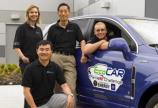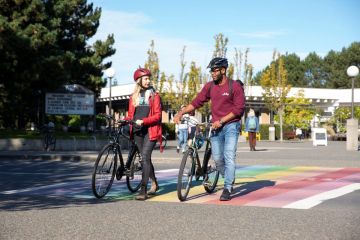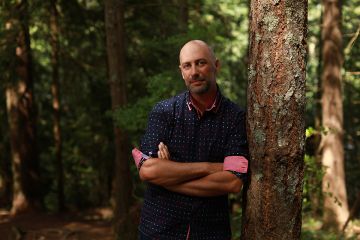The green challenge: UVic EcoCAR Team
- Peigi McGillivray

What cars will we drive in the clean, green future? How can we minimize fuel consumption and reduce emissions while keeping the performance, safety and design that we all want when we drive?
These are just a few of the questions UVic students, faculty and staff are addressing as they compete in an elite North American-wide green vehicle technology competition—EcoCAR: The NeXt Challenge.
Pitting engineering students from 17 North American universities against one another, the three-year competition fosters innovative approaches to designing and building vehicles using leading-edge automotive and electronic technologies.
At the end of the first year of competition, UVic’s EcoCAR team placed second overall, with top-place honours in technical reports, computer modeling, electrical systems and media relations.
“Student response has been tremendous,” says Dr. Zuomin Dong, EcoCAR advisor and chair of mechanical engineering. “Last year’s team included more than 40 undergraduate and graduate students in engineering and computer science. They’re all getting real-world, hands-on experience that will enable them to make valuable contributions in tomorrow’s automotive industry.”
During EcoCAR’s first phase, the UVic team used an advanced computer modeling system to develop a new, highly efficient, hybrid power train. “We’ve designed it, modeled it and tested the model; now all we have to do is make it real,” says team leader and engineering graduate student Jeremy Wise.
To do that, the team will modify and manufacture all the required components and re-engineer the power train of a 2009 Saturn Vue donated by General Motors.
“We’re transforming an off-the-assembly-line Saturn into an energy-efficient, low-emission, four-wheel-drive, extended-range hybrid vehicle that can travel up to 60 km on electric power alone,” says Wise.
“We have to make sure each component in the drive train works perfectly,” says Dong. “The competition also requires us to maintain the car’s consumer appeal—including good acceleration and handling, comfortable seating, adequate leg room and ample cargo and towing capacity. It has to be a car that people would want to drive.”
Just before Christmas, the team took delivery of five advanced lithium battery modules donated by A123 Systems. The team designed and fabricated a large battery pack with new cooling, packing and control systems to be integrated into the vehicle.
UVic’s participation in the EcoCAR Challenge builds on 10 years of successful fuel cell and hybrid vehicle research. This includes developing advanced modeling tools to understand multiple-mode power trains, creating an electric and fuel cell testing platform to speed the transfer of technology from the lab to industry, and establishing a unique green vehicle research and training facility that will draw researchers from across the continent.
“With Canada’s abundantly available clean hydro power, it makes sense for us to explore the possibilities of plug-in hybrid electric vehicles and extended-range electric vehicles,” says Dong, “UVic is building the facilities we need to provide global leadership in this growing field. Our EcoCAR team is showing the world just how far we can go—and how little carbon it will take to get us there.”
More information on UVic’s EcoCAR team





